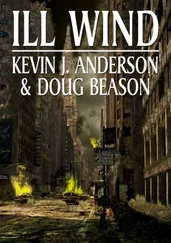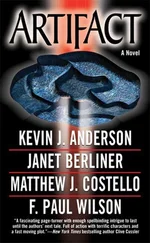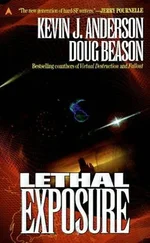“Graham, it doesn’t happen that way. We survive it. Times get ugly and paranoid for a while, but we survive. You can’t uninvent something!”
“But I can certainly delay its progress. That’s the beauty of having a classified program, Elizabeth—only the senior staff know how the entire project fits together. Once you get rid of most of the people who know how to make the Gadget—”
“Get rid of… ” She glanced at the jeep and started to move toward it. Her heart pounded. Fox grabbed her arm, squeezing and digging in with his fingernails. “Don’t touch me!”
“You’re going to stay right here. You can’t make it back to the command bunker before the detonation.” He looked ludicrous with white suntan cream smeared on his cheeks and nose. But his words frightened her very much.
Fox turned back to look at the tower. In the distance the first rays of the sun had just begun to peek over the San Andres mountains. It would be several minutes yet before the light hit the ground around the base of the mountains.
“Fifteen minutes,” the radio said.
Elizabeth whirled and lashed out, jerking herself from his grip. He clung to her blouse so that it ripped along one seam. “You cannot make it!” he said.
She started for the jeep again, but Fox tackled her. Sharp rocks and sand stung her face, and she coughed, trying to wheeze her breath back. Fox held her down. She squirmed and kicked.
“It is already done, Elizabeth. Everything is in place. I hid some of the test explosives inside the command bunker, then wired the detonation to occur in parallel with the bomb. They’ll never even feel it.”
She thought of Oppie and Groves and Feynman and all the other scientists in the command bunker, leaning forward, waiting to see the flash that would be brighter than a thousand suns.
“No!” She moved sideways and brought her knee up, jamming it between Fox’s legs, then punched him in the larynx, using the sharp edges of her knuckles. Being a student in Berkeley had taught her plenty of self-defense techniques.
Fox mewled and turned to jelly. She scrambled out from under him and crawled toward the jeep.
“Too late,” Fox wheezed behind her.
“Oh shut up!” Elizabeth threw a glance at the radio. The Army field unit was propped up against one of the muddy tires. Painted a khaki green, it was as big as a large knapsack.
“Ten minutes,” the voice said. “Minute by minute countdown starting now.”
The dials looked incomprehensible to her; she couldn’t make out any of the settings. Nothing came from the speaker box except a quiet hiss of background static. Elizabeth dropped to her knees and started flipping dials. “Hello, can anyone hear me? Hello?” She leaned into the device. “Answer me!” She smacked the radio with the flat of her hand.
Fox’s voice came from behind her. “There’s no microphone, Elizabeth. They didn’t want the scientists to inadvertently compromise the test by breaking radio silence.”
She scrambled back over and grabbed his hair to smash his head down on the sand. “Then give me the keys to the jeep. Now!”
Fox grunted and tried to claw at her with his hands. She pointed her fingers straight out and held them like an icepick in front of his wide, glazed eyes. “Give me the keys, dammit, or I’ll gouge your eyes out!”
He tried to roll her off of him, then groaned in his own agony.
“All right, we’ll do the left eye first!” She drew back her hand.
Fox gasped his words. “No, no!” He seemed to realize he couldn’t get away. “Jeep… doesn’t have keys!”
Elizabeth leaped to her feet, feeling stupid. Of course, the Army Series M vehicles used only a starter button. She thought about kicking Fox one more time in the kidneys for good measure, but sprinted for the jeep instead.
She threw herself behind the steering wheel and fumbled for the starter button. She pushed her hair out of her eyes. In the distance the area around the shot tower remained deserted. Nothing moved as far as she could see, where moments before the area had been a flurry of activity—jeeps had bounced across the desert, carrying last-minute dispatches; scientists had set up their diagnostics. Now nothing moved as far as she could see. The desert waited for a second sun to rise.
Setting the choke, she pushed the starter button. The engine caught, and she jammed it into gear. The vehicle lurched forward.
And then Fox stood there, somehow getting to his feet and throwing himself in front of the jeep. She swerved, ran into a rock and bumped over it. The front headlight struck Fox and sent him sprawling back to the sand. She could see blood in the dim dawn light. Fox screamed in pain, then shouted a last, plaintive “Stop!”
She gripped the steering wheel and did not move for a fraction of a second. Fox was hurt. He needed help. She remembered holding him, talking with him, making love to him.
She recalled sitting in front of a car, skier 4, in the Livermore demonstration. She had trusted civil rules of protest. Instead, she had now run down Graham Fox.
You gotta do what you gotta do, and damn the consequences. She should stay with Fox, take care of him, see what she could do to help him. What if he was dying? What if she had killed him? She didn’t have time to prevent anything back at the bunker anyway. She couldn’t stop the explosion from killing all the scientists. She had to get her priorities straight.
“I can try,” she said to herself, and left Fox lying there as she let up on the clutch. The jeep jerked as it moved into first gear, but she managed to keep it moving. The stick shift wasn’t too different from what she had learned to drive, but it took most of her remaining energy to jam the clutch to the floor.
The jeep sped off, spewing wet sand from its tires. Fox raised a hand, trying to call her back, but she ignored him. She had made her choice. His wasn’t the only life at stake.
Things had changed from what she thought. These people were not the historical monsters she had imagined them to be years ago when she was with the Livermore Challenge Group or with her Santa Fe activists. Flesh, blood, feelings—and things were different here.
The jeep picked up speed as she ran through the gears. Her body smacked against the side of the vehicle as she hit a depression; she clung to the wheel to keep herself from bouncing out. She could hardly see the road. She fumbled for the headlights, but they helped little in the growing glare of sunrise. Still, she kept the jeep pointed toward the command bunker, a good five miles away from her, from Ground Zero.
She had to punch the vehicle to over sixty miles an hour. Could an old Army jeep even go that fast? It had to. She had less than ten minutes. She pressed the pedal to the floor. Over the bouncing she could make out that the wobbling speedometer read a maximum of fifty miles an hour. The rough desert road made her bones rattle in their sockets. She didn’t have any idea how fast she was really traveling, but she prayed that there would be time to reach the bunker.
She didn’t want to be caught in the open when the blast went off. In her mind she saw a snippet of one of the silly civil defense films from the fifties, with cartoon ducks singing a ditty about how to “duck, and cover!” if you happened to be away from a fallout shelter during a nuclear air raid.
As she came closer to the bunker she blasted the horn and yelled at the top of her lungs. “Come on, somebody let me know you’re hearing me!”
She couldn’t tell how far she had gone, or even how far she had left to go. The bunker seemed to sit fixed on the horizon with the tower standing vigil five miles farther away.
She didn’t even know if they could stop the test.
Читать дальше












